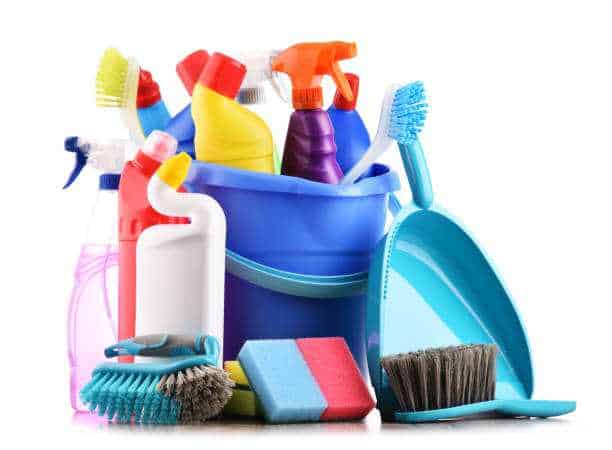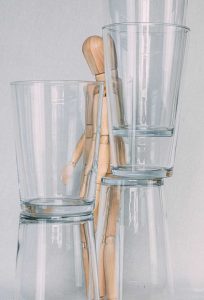Most days fly by whipping up delicious meals in the kitchen. No matter the size of your kitchen, it must stay clean and sparkling. With all the cooking and people constantly coming and going, the kitchen can get messy in no time.
Now, the question is how to keep your kitchen clean and hygienic, and this post aims to answer just that.

During cooking, the smoke merges with the water vapor in the air to form a sticky substance. Gradually, this oil becomes sticky. It requires more effort to eliminate the stickiness and dirt of the kitchen floor and kitchen appliances.
But if they are not cleaned regularly, smoke, spices, vegetable broth, oil, and heat spread around the kitchen walls, tiles, sinks, stoves, and other kitchen surfaces. So, it is essential to clean these stains regularly to maintain a clean and useable kitchen.
Otherwise, stains and dirt accumulate and gradually harden, making cleaning much more challenging. This means it might take a whole day to clean the room than if messes were cleaned as they occurred. But if you want, you can easily clean your kitchen and kitchen appliances using a few simple steps with a little effort.
[joli-toc]
Necessary Kitchen Cleaner Equipment & Ingredients
The equipment needed to keep the kitchen clean and hygienic includes sponges and scourers, a dustpan, a cleaning brush, protective gloves, kitchen towel, paper towels, kitchen tissue, napkin, microfiber cloths, floor wiper, etc.
Kitchen stains, dirt, germs, harmful bacteria, and odors can be cleaned with natural and chemical ingredients. Natural ingredients include water, ice, lemon, tamarind, sugar, salt, turmeric, baking soda, and vinegar. With the help of these, stubborn stains can be removed relatively easily.
Lemon can also play a role in keeping the air in the kitchen fresh. Also, various kitchen tools are cleaned with vinegar, bleach, and other cleaning solutions. Bleach is suitable for tile cleaning. Baking soda usually helps to remove stains.
Also, many kitchen cleaning products for different types of stains are available in the market. Air freshener spray can remove kitchen odor and keep the kitchen air fresh.
Giving a minimum of 30 minutes per day is recommended to clean the kitchen.

Steps On How To Keep Your Kitchen Clean And Hygienic
Why is it important to keep your kitchen clean? Because this is where you make food for the family. A hygienic kitchen keeps your family away from foodborne illness.
Here are the steps to keep your kitchen clean and hygienic.
Washing Dishes And Utensils
The clean kitchen gets dirty after cooking and eating, with dishes, pots, and pans beginning to build up by the sink. Not only does this use up counter space, but it can also cause dirt to build up and spread.
As the dirty dishes are also made of different materials, they will likely need to be washed in different ways. These washing methods will be explained below:
Glasses and plates must be washed carefully as they are often delicate and break easily. Most glass utensils can be cleaned and disinfected with a dishwasher. Soapy water can also be used. Glass containers should not be rubbed hard.
Mix lemon in lukewarm water to remove the oil. It will wash away the oil fat efficiently, and there will be no odor. After washing, use a soft clean cloth or sponge to wipe them. This will not cause stains, and the glass will be shiny like new.
With long-term use, pyrex vessels often show yellow spots. Rub lemon on it and wash it off with liquid soap to clean it. The stain will go away immediately.

Never rub a non-stick pan with a hard sponge, or try rubbing it hard. These pans have a coating to prevent food from sticking when cooking, and this coating can be removed with a too-rough scrub.
Also, alkaline soaps or dishwashers should not be used. That will make a permanent stain. Non-stick pots can be easily cleaned with less alkaline soapy water and a thin clean cloth or soft sponge. If you use vinegar, the stain will go away almost instantly.
Plastic containers must be food-grade; this will often be stated on the packaging when you first buy them. These containers are so popular because they are useful and easy to wash.
They can be cleaned with a liquid cleaner. Soaking it in a mixture of liquid chlorine bleach for 20-30 minutes will remove the stains and bad smell if there are more stains. If that doesn’t work, keep them in the solution of lemon juice and one tablespoon of apple cider vinegar in water for 8-10 minutes and wash it off.

Usually, spoons and knives are made of stainless steel or aluminum. These are either washed with a dishwasher or by hand. White vinegar can sometimes be used if there are more stains, too.
Cutting boards should be used separately for fish, meats, and vegetables. Otherwise, before cutting other items, wash well. You can clean the chopping boards with a dishwasher.
Steel and brass plates should be washed with soapy water or liquid cleaner. It should be wiped immediately — otherwise, water stains will form on them.
If stains form on brass, this can be removed with mustard oil and turmeric powder.
The containers or boxes we use to keep spice items are often stained. To keep them relatively clean and tidy, they must be washed regularly. Otherwise, the spice stains may stick completely. After washing, it must be wiped with a thin cloth, tea towel, paper towel, or kitchen towel and kept on a specific shelf.
To Clean The Gas Stove And Cooker.
Some use gas stoves, cookers, or electric induction for cooking food. As a result, cooking oil, broth, and spices fall and become stains. Many times for milk or tea, the spots become stiff and rigid. To remove the stains on the stove, mix a teaspoon of salt in hot water and rub it well.
Stains can also be removed by applying a cleaner on a sponge. The cooker’s pan should be washed and dried as per instructions at the end of cooking. As induction is an electrical product, you can wipe it with clean kitchen tissue or tea towels after cooking, preventing stains from forming.
To Clean The Kitchen Sink.
The kitchen sink is essential and widely used in the kitchen. The dirty dishes and the vegetables, fish, and raw meat are washed in the sink, so it can get stained quickly. This means regular cleaning is necessary for a kitchen sink. Soap or liquid cleaner can be used. Otherwise, the stain will settle and harden.
Rub the stain well with lemon juice and baking soda if the stain persists. Then sprinkle with vinegar, wait a while, and clean the empty sink.
To Clean The Cabinet And Shelves.
The way to keep kitchen cabinets and shelves in good shape is by washing and drying them well before placing any utensils, canned foods, and raw foods there. Different types of cleaners on the market can be used to clean the cabinet and shelves. Before placing anything inside, you must spread a thin cloth or paper towel on the cabinet surface. Change the paper towel or cloth regularly.

To Clean The Kitchen Countertop And Surface.
Kitchen counters and surfaces are the dirtiest when preparing and cooking food. It should be wiped well every day with a clean wiper. Disinfectants on the market are used to sanitize surfaces regularly.
Once a stain forms on the tiles, mix vinegar and water in equal proportions, spray it on top, and wipe it off with a thin cloth. Baking soda can also help to remove stains.
To Clean The Microwave Ovens And Blender.
Food is heated, cooked, and baked in the microwave. So it is typical to get stains and dirt inside. Oven cleaners can be used for this and are available on the market. Glass cleaners can also be used; they should be applied on a cloth or tissue and wiped well inside and out. And if you want to remove odor from a microwave, you can heat vanilla essence or lemon juice inside it.
Blender is very useful for our fruit juices and spices blend. However, it seems a little difficult for us to clean. To make it easier to clean, mix the liquid dishwasher with water, and blend inside for 30 seconds to 1 minute to clean appropriately.
Since the microwave and blender are electric, they need to be cleaned carefully, and stains removed every time.
To Clean The Refrigerator.
The essential thing in our kitchen is the fridge. Refrigerators keep food, vegetables, fruits, fish, and meats in good condition for a long time. The refrigerator is the hardest to clean. Clean the fridge with these few steps.
First, you have to take out all the food. If you unplug the power line and leave the fridge open for a while, the ice will continue to melt.
Then you have to take out the drawers and trays. You must put it in the defrosting mode in the fridge and place the thin paper inside. When all the ice is melted, the papers have to be removed. This will remove the dirt from the refrigerator shelf.
Then mix vinegar in warm water and clean the inside carefully. If there are stains, you can use a rough sponge. The handle and door must be cleaned with cleaner and a soft cloth. You can clean the inside by mixing baking soda to remove the fridge’s smell.
Finally, wipe the inside and outside very well. It should be dried using a microfiber cloth.
You should be cleaned well after 1/2 month to keep your fridge clean. Otherwise, the food may spoil, smell bad, or the whole fridge may become damaged.
To Clean The Water Filter.
We use water filters to purify the water, but it has to be cleaned regularly. Otherwise, the filter becomes dirty due to the accumulation of algae in the water, and often the water gives off a foul odor.
In the case of dirt or algae, it should be rubbed with a brush lightly. Alkaline cleaners should not be used. It is best to change the water after 8-10 days.
Tea-coffee Maker’s Cleaning Method.
Tea and coffee makers quickly accumulate stains. Separate cleaners are available in the market. The easiest way is to mix a liquid dishwasher and water and complete a cycle. Vinegar can be used in the same way.
The outside of the tea vending machine should be cleaned regularly. The water reservoir can be cleaned with a dishwasher. Both manual and one-touch coffee makers can be cleaned in the same way.
If tea or coffee stains ceramic cups/mugs, using vinegar and salt will remove them quickly.
To Keep It Odorless.
Since vegetables, fish, and raw meat are all cut, washed, food prep, and cooked in the kitchen, it is normal to have a persistent smell in the area. Very small but effective techniques can be quickly followed to eliminate this stench.
Never store waste parts, leftovers, and dirt. Throw it in the dustbin immediately and wash dishes daily. Rub the floor and countertop with ice and lemon juice to remove odors from kitchen utensils.
Dealing With Pests In The Kitchen.
Insects like rats and cockroaches infest when the place is dirty. Lemon slices can be put in different kitchen corners to protect against insects.
Besides, the garbage basket should be cleaned regularly and disinfected at the end of the cleaning. After washing the basket, dry it in the sun and use baking soda to eliminate the bad smell.
Good quality scented sprays are available in the market, which can be used to make your kitchen environment fresh.
Kitchen Walls And Windows.
Although everything is clean, many people are unaware of cleaning the kitchen’s windows, doors, and walls. You have to sweep the kitchen wall and floor one day a week. If the window is glass, it should be cleaned with glass cleaner and a soft cloth or tissue.
In addition, only put a few things or necessary things in the kitchen. Or don’t clutter the kitchen with whatever you can get your hands on because it becomes hard to clean. Keep a few things in the kitchen as possible. It will be as convenient as the work and will be less dirt. According to experts, the smoke, oil, and steam created during cooking will be expelled if the kitchen has some kitchen accessories like a kitchen chimney, hood, exhaust fan, and ventilator. Kitchen oil will be less sticky. Cleaning the kitchen also becomes more manageable.
How To Keep Your Kitchen Clean And Hygienic From Covid-19
We are all going through a pandemic now. Extra precautions should be taken to avoid Coronavirus since everything from outside is brought and kept in the kitchen. First, you have to disinfect the bags and packets of everything. Raw vegetables and fruits should be soaked in salt water before eating. Fish, meat, and eggs should be cooked well.
Don’t Forget To Disinfect.
Everything used should be disinfected with an alcohol-based sanitizer. Kitchen counters and surfaces should be thoroughly washed and sprayed with disinfectant regularly. They can also help keep away from other viruses and can stop bacteria growth.
Extra precautions can protect us from the Coronavirus. You must keep your surroundings clean, wash your hands, keep a safe distance, wear a mask, use hand gloves, and keep the kitchen clean and hygienic.
We Hope You Are Ready To Clean The Kitchen.
And regular kitchen cleaning will help keep both your mind and body well. Clean the kitchen regularly and keep kitchen appliances organized, your energy will be much less wasted, and the cost of extra money will be reduced. It is necessary and worthy to develop regular kitchen cleaning habits to maintain the family’s good physical and mental health, maintain the nutritional value of the food and food safety, and protect your family from illness.

